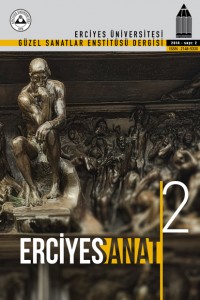Öz
Bu çalışmada sanat eğitiminde müfredatın içeriği, ders saatleri, sanat eğitiminde bilgi ve iletişim teknolojilerinin kullanımı, sanat eğitimini desteklemek için kurulan uluslararası örgütler ve ağlar, sanat ile okul işbirliği, sanat eğitimini desteklemek için müfredat dışı kültürel faaliyetlerin organizasyonu, sanata ilişkin festivaller, yarışmalar, sempozyumlar ve kutlamalar, sanat eğitimini destekleyen girişimler ve sanat öğretmenlerinin eğitimi ve yetiştirilmesi incelenmiştir. Çalışmada sanata, sanat eğitiminin önemine değinilmiş, sanat eğitiminde geçmişten günümüze kadar uygulanmış yöntemler/yaklaşımlar üzerine belirlemelerde bulunulmuş ve bu kapsamda, çocuk merkezci yaklaşım, deneyci yaklaşım ve disiplin merkezci yaklaşım yöntemleri üzerine değinilmiştir. Dünya üzerindeki ülkelerin ve Türkiye'nin sanat eğitimi müfredat programı uygulamalarında temel aldığı noktalar ele alınmıştır. Dünya üzerinde ki ülkeler genelinde müfredatlarında benimsemiş ve uygulamakta olduğu “bütünleşik” ve “bağımsız” sanat eğitimi yöntemlerine değinilmiştir.Dolayısıyla müfredatlarında sanat eğitimini“bütünleşik” ve “bağımsız” olarak adlandırılan sistemlerle eğitim veren ülkeler belirlenmiş ve bununla birlikte Avusturya, Finlandiya, İrlanda,, Fransa, İtalya, Romanya, Letonya ve Türkiye gibi ülkelerin uygulama örneklerine ve müfredatlar arasında ki zorunlu sanat dersleri saatlerine yer verilerek Bilgi İletişim Teknolojilerinin (BIT) ulusal/uluslararası kullanımına ve yaygınlaştırılmasına, okullardaki fizyolojik şartların uygun ve etkin olarak düzenlenmesine, okul dışı aktivitelerin/faaliyetlerin arttırılmasına dolayısıyla bu kapsamda kültürel gezileri ve ,müze bilincinin önemine vurgu yapılmaya çalışılmıştır. Diğer taraftan sanat eğitimi için öğretmen yetiştirilmesine duyarlıklarına ve pedogojik formasyonlarının önemine vurgu yapılmış ve değerlendirmelerde bulunulmuştur. Öyle ki Müfredat ve standartlarıyla öğrencilerin ulaşılması beklenen temel becerilerinin neler olması gerektiğine değinilmiş ve programların uygulanabilirliğinin önemine dikkat çekilmiştir.
Anahtar Kelimeler: Sanat, sanat eğitimi, müfredat, teknoloji.
Abstract
In this study, content of curriculum, hours of lessons, usage of information and communication technology in arts education, international organizations and networks over the world for supporting art education, collaboration of school and world of art, organisation of extra-curricular arts and cultural activities for supporting arts education, arts-related festivals, celebrations and competitions over the world for supporting arts education, other initiatives to support and develop arts education and education and traınıng of art teachers were examined. In the study, importance of arts education and art were mentioned, and some determinations were made on methods/approaches implemented from the past to the present and in this context, it is mentioned about the methods of child-centered approach, experientalist approach and discipline-centered approach. The fundamental principles for implementations of arts education curriculum program in Turkiye and in the countries over the world were discussed. In this context, some evaluations were carried out by considering examples of implementations of the countries over the world. The methods of arts educations such as “integrative method” and “separate method” adopted and implemented in the curriculums throughout the countries over the world were mentioned. Hence, the countries preferring education systems titled as “integrative” and “separate” systems in their curriculums were determined and national/international usage of Information and Communications Technologies (ICT) and its dissemination, necessity for arrangement of physiological conditions properly and actively in the schools, enhancement of activities out of the school were mentioned by including practice samples and hours of compulsory arts education between the curriculums from some countries such as Austria, Finland, Ireland, France, Italy, Romania, Latvia and Turkiye and thus in this context it has been tried to focus on cultural trips and importance of museum consciousness. On the other hand, educating teachers for arts education, their sensibilities and importance of their pedogical formation were focussed and some evaluations were carried out. Such that, what kind of basic skills the students are expected to achieve by the curriculums and standards has been mentioned and the importance of feasibility of programs has been pointed out.
Keywords: Art, arts education, curriculum, technology.
Anahtar Kelimeler
Kaynakça
- ARABACI, M. (2006). Sanat Eğitiminde Çoklu Zeka Kuram: ve Kaynaştirtlmtş Sanat
- Eğitimi Yöntemi (İlköğretim İkinci Kademe Resim-İş Eğitimi Programi Örneği İle), Uludağ Üniversitesi Sosyal Bilimler Enstitüsü Güzel Sanatlar Eğitimi Anabilim Dalı, Yayımlanmamış Yüksek Lisans Tezi, Bursa. EDMAN, I. (1977). Sanat ve İnsan, (Çev: Turhan Oğuzkan), İnkılap ve Aka Kitabevleri, 2. Baskı, İstanbul,
- ETİKE, S. (1995). Sanat Eğitimi Yazıları, İlke Yayınevi, Ankara,
- KIRIŞOĞ LU, O. T. (2002). Sanatta Eğitim: Görmek, Öğrenmek. Yaratmak, Pagema
- Yayıncılık, 2. Baskı, Ankara, READ, H. (1974). Sanatın Anlamı, (Çev: Güner İnal, Nuşin Asgari), Türkiye İş Bankası
- Yayınları, 2. Baskı, İstanbul, SAN, 1. (2003). Sanat Eğitimi Kuramları, Ütopya Yayınevi, İstanbul.
- (2006). Görsel Sanatlar Dersi (1-8. Smg'ladöğretim Program: ve Kilavuzu, Devlet Kitapları
- Müdürlüğü Basımevi, Ankara. (2009). Ortaöğretim 9. 10, H ve i 2, Sınıflar Görsel Sanatlar (Resim) Dersi Öğretim
- Programı, MEB Yayınları, Ankara, http:iidhgm.meb.gov.triyayimlartdergileriMilIi_Egitim_Dergisiil 60t'katiranci.htm http: iwwweurydiceorg. http: twww.ncca.ietentCuı-riculum_and_AssessmenttEarly_Childhood_and_Primary_Educatio ntPrimary_School_Curriculuthrimary_School_Curriculam_Documentsi. ERCIYES Slılııtîtmcıvrs unıvmsıırsı msrırusu ornoısı mı:. savı ?
Öz
Kaynakça
- ARABACI, M. (2006). Sanat Eğitiminde Çoklu Zeka Kuram: ve Kaynaştirtlmtş Sanat
- Eğitimi Yöntemi (İlköğretim İkinci Kademe Resim-İş Eğitimi Programi Örneği İle), Uludağ Üniversitesi Sosyal Bilimler Enstitüsü Güzel Sanatlar Eğitimi Anabilim Dalı, Yayımlanmamış Yüksek Lisans Tezi, Bursa. EDMAN, I. (1977). Sanat ve İnsan, (Çev: Turhan Oğuzkan), İnkılap ve Aka Kitabevleri, 2. Baskı, İstanbul,
- ETİKE, S. (1995). Sanat Eğitimi Yazıları, İlke Yayınevi, Ankara,
- KIRIŞOĞ LU, O. T. (2002). Sanatta Eğitim: Görmek, Öğrenmek. Yaratmak, Pagema
- Yayıncılık, 2. Baskı, Ankara, READ, H. (1974). Sanatın Anlamı, (Çev: Güner İnal, Nuşin Asgari), Türkiye İş Bankası
- Yayınları, 2. Baskı, İstanbul, SAN, 1. (2003). Sanat Eğitimi Kuramları, Ütopya Yayınevi, İstanbul.
- (2006). Görsel Sanatlar Dersi (1-8. Smg'ladöğretim Program: ve Kilavuzu, Devlet Kitapları
- Müdürlüğü Basımevi, Ankara. (2009). Ortaöğretim 9. 10, H ve i 2, Sınıflar Görsel Sanatlar (Resim) Dersi Öğretim
- Programı, MEB Yayınları, Ankara, http:iidhgm.meb.gov.triyayimlartdergileriMilIi_Egitim_Dergisiil 60t'katiranci.htm http: iwwweurydiceorg. http: twww.ncca.ietentCuı-riculum_and_AssessmenttEarly_Childhood_and_Primary_Educatio ntPrimary_School_Curriculuthrimary_School_Curriculam_Documentsi. ERCIYES Slılııtîtmcıvrs unıvmsıırsı msrırusu ornoısı mı:. savı ?
Ayrıntılar
| Birincil Dil | Türkçe |
|---|---|
| Yazarlar | |
| Yayımlanma Tarihi | 11 Nisan 2014 |
| Yayımlandığı Sayı | Yıl 2014 Sayı: 2 |

